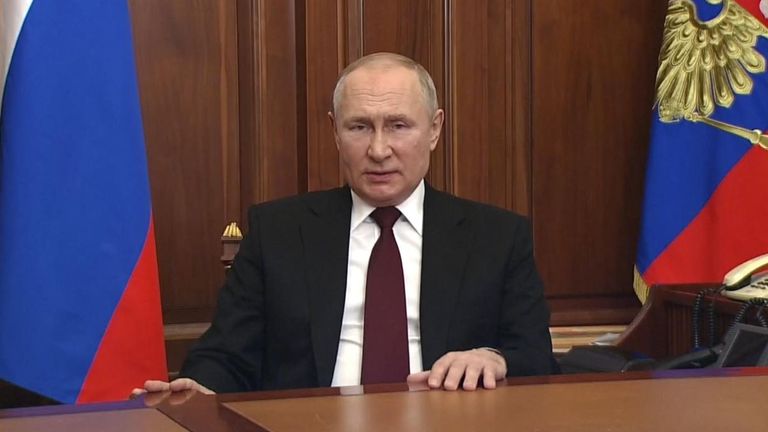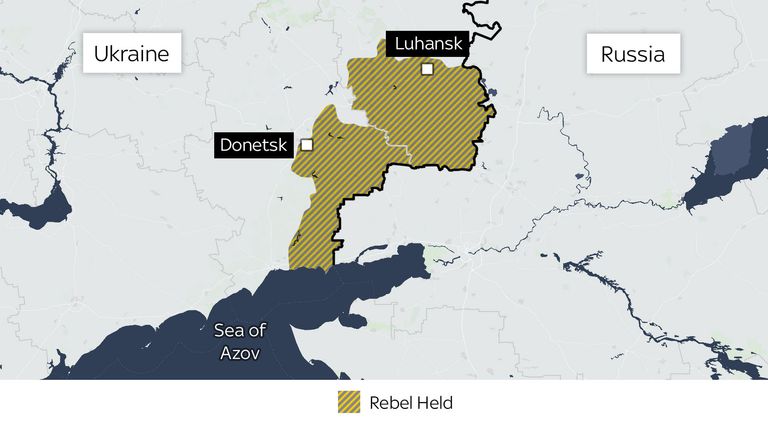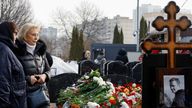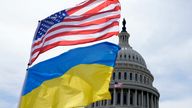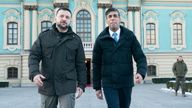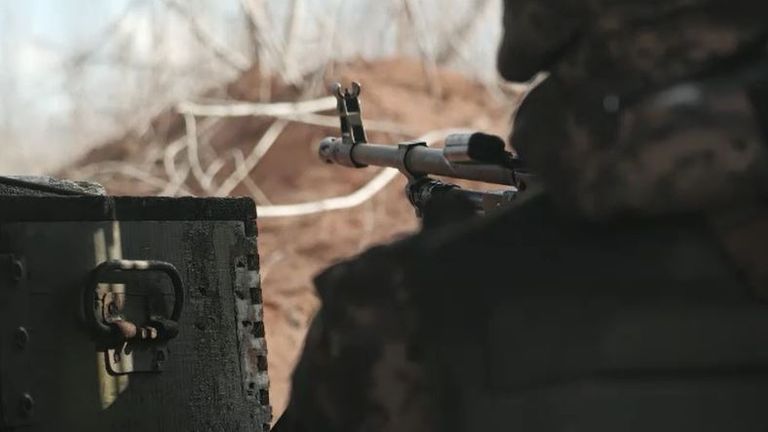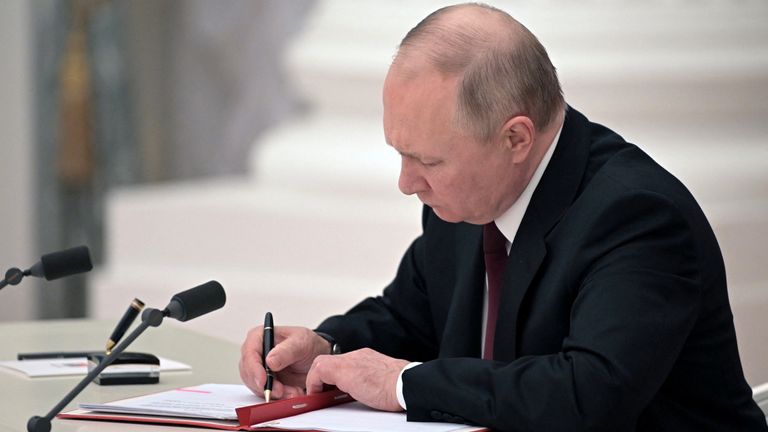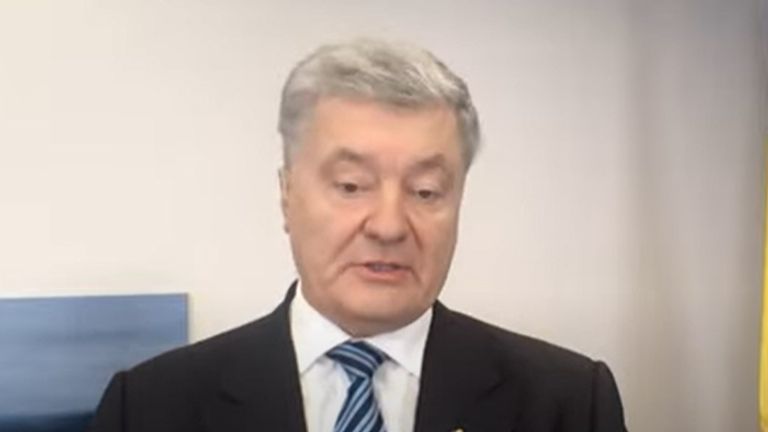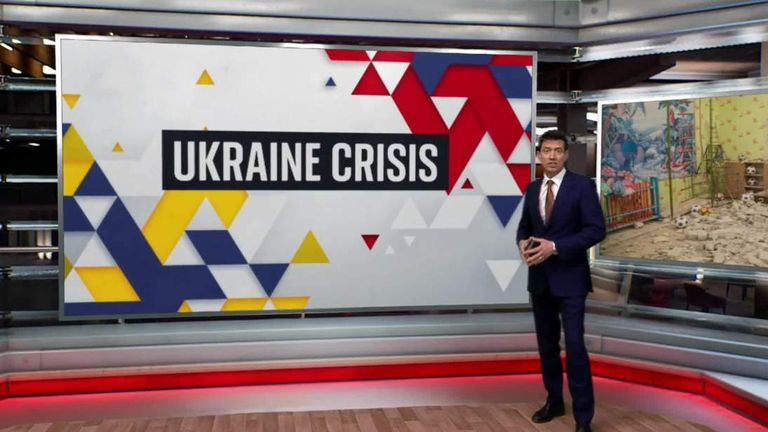Ukraine crisis: International condemnation as Putin sends troops into eastern Ukraine
Recognition by Mr Putin of their independence paves the way to give them military support - and the president has now ordered an operation in the two regions.
Tuesday 22 February 2022 11:14, UK
The US and the UK have led the condemnation of Russia after Vladimir Putin has declared he recognises the independence of two separatist-held regions in eastern Ukraine - and was sending in troops.
At an emergency meeting of the UN Security Council, chaired by Russia, US ambassador to the United Nations Linda Thomas-Greenfield said "the consequences of Russia's actions will be dire - across Ukraine, Europe and the globe".
She said Russian recognition of the separatist regions was "clearly the basis for Russia's attempt to create a pretext for a further invasion of Ukraine".
Mr Putin's announcement follows requests by the leaders of the two Russian-backed regions, Donetsk and Luhansk.
The self-proclaimed republics broke away from Kyiv's control in 2014 - but are Ukrainian under international law.
Pro-Russian separatists and Ukrainian government forces have been involved in clashes there for several years and the fighting has intensified recently.
Mr Putin has now ordered what was described as a "peacekeeping" operation in the two regions, which are part of Donbas.
Recognition by the president of the regions' independence paves the way to give separatists military support and has provided a pretext for Russian troops to cross the border into those areas.
The move could further narrow diplomatic options to avoid war, as it marks a rejection of an eight-year-old ceasefire, brokered by France and Germany under the Minsk agreements, which have been pushed as the framework for any future negotiations on the crisis.
Putin - Eastern Ukraine part of ancient Russian lands
An estimated 150,000 Russian troops have now massed on Ukraine's borders amid fears of a full-scale invasion. The US puts the figure at 190,000.
Justifying his latest decision, Mr Putin described Ukraine as an integral part of Russia's history and said eastern Ukraine was ancient Russian lands, adding he was confident Russians would support his decision.
Sanctions over breakaway regions
In response, the White House said President Joe Biden signed an executive order prohibiting "new investment, trade, and financing by US persons to, from, or in" the two breakaway regions.
The order will "also provide authority to impose sanctions on any person determined to operate in those areas of Ukraine". And there will be further measures separate from sanctions that the US and its allies have been preparing if Russia invades Ukraine.
A top EU official, Didier Reynders, said the bloc is ready to implement sanctions over what it described as an "act of war".
Foreign ministers from EU countries will make a decision today on what sanctions to impose, according to the bloc's foreign policy chief Josep Borrell.
"We must act quickly ... that means this afternoon," he said.
Japanese Prime Minister Fumio Kishida said his country would discuss possible "severe actions", including sanctions, with the international community, while Australian Prime Minister Scott Morrison said "the moment that other countries put in place strong and severe sanctions on Russia, we will be in lockstep with them and we will be moving just as quickly."
NATO secretary general Jens Stoltenberg accused Russia of continuing to fuel the eastern Ukraine conflict and "trying to stage a pretext" for a further invasion.
UK Prime Minister Boris Johnson said Mr Putin has broken international law and said the UK will hit Russia with a "first barrage" of sanctions which he will outline later today.
In a phone call with Ukraine's president, Mr Johnson "said he would explore sending further defensive support to Ukraine, at the request of the Ukrainian government" - but Health Secretary Sajid Javid said the UK would not deploy troops to the country.
Ukraine wants to join NATO in future - but neighbouring Russia is vehemently against this and Mr Putin claimed the Western alliance has "completely ignored our concerns", adding if Ukraine was admitted it would be a "direct threat" to Russian security.
Putin warns of NATO enlargement
Mr Putin wants a guarantee from the West that Ukraine will never be allowed to join, and during his lengthy speech he said the question of Ukraine's entry has been decided in advance.
He said he understands that further enlargement of NATO is only a matter of time and the risk of a sudden strike against Russia will sharply grow if it expands.
The Russian president claimed the US and NATO have "unashamedly turned Ukraine into a theatre of war".
And he believed Ukraine plans to create its own nuclear weapons, adding that if it acquires weapons of mass destruction "the global situation will change drastically, we cannot ignore this".
He said such nuclear weapons would amount to a preparation for an attack on Russia.
There has been fighting in the breakaway regions between pro-Russian separatists and Ukrainian pro-government forces for several years.
Follow the Daily podcast on Apple Podcasts, Google Podcasts, Spotify, Spreaker
More than 14,000 people have been killed since conflict erupted in Donbas (which includes Luhansk and Donetsk) in 2014, shortly after Moscow annexed Ukraine's Crimean Peninsula.
Russia denies being part of the conflict but has backed the separatists with covert military support, financial aid, supplies of COVID-19 vaccines and issuing at least 800,000 Russian passports to residents.
Shelling has intensified since last week along the frontline between the rebels and Ukrainian forces.
Read more:
As warnings of war grow, fear is also being felt in neighbouring Poland
Officials in Russian-backed regions press-gang older men into their militias
Kyiv volunteers stock emergency shelters amid warnings of imminent invasion
How big is Russia's military - and how does it compare with Ukraine?
Recognising Donetsk and Luhansk allows Russia to send troops into Ukraine, Sky News' Moscow correspondent Diana Magnay says.
She said: "Phase one could just be sending in the troops, but then of course you have a situation where Russian troops are facing off against Ukrainian troops directly - up until now it's essentially been a proxy battle where Russian weapons, and back in 2014-15 some Russian forces, but far less now, were fighting each other in this long eight-year war.
"Then you will have a situation where you have Russians against Ukrainians. You might have skirmishes which would give further justification to go further.
"Now the separatists only occupy parts of those two regions and that would mean Russia pushing towards the borders."
On Friday, the rebels started bussing tens of thousands of civilians to Russia, accusing Kyiv of planning an attack - which Ukraine denies as propaganda.
Ukraine and the West consider the rebels to be Russia's proxies, and have been warning for weeks that Moscow might use them to construct a case for war.
The Russian president denies he is planning to invade his neighbour, saying his forces are there for military drills.
But Moscow has threatened unspecified "military-technical" action unless it receives sweeping security guarantees, including a promise that Ukraine will never join NATO.
At a televised meeting of his Security Council, which normally meets behind closed doors, Mr Putin restated Russia's demands, insisting it was not enough for the West to say Ukraine was not ready to join NATO at present.
